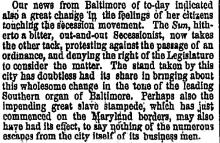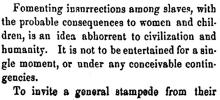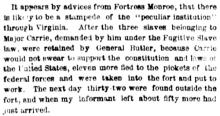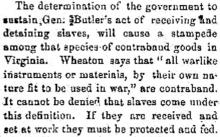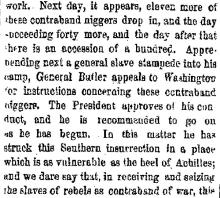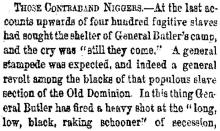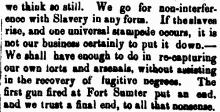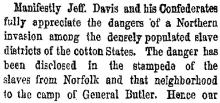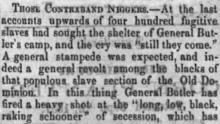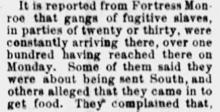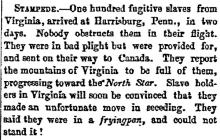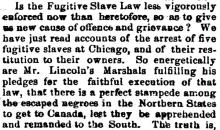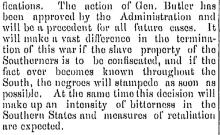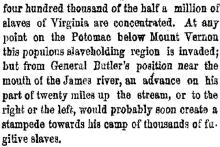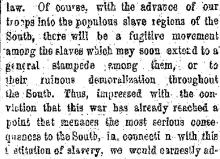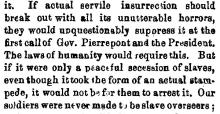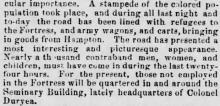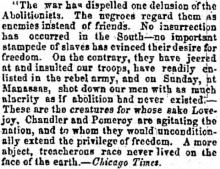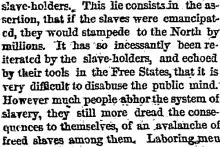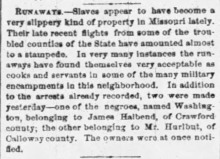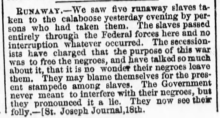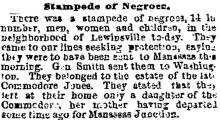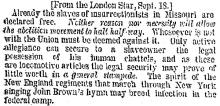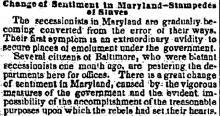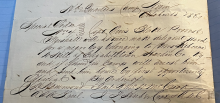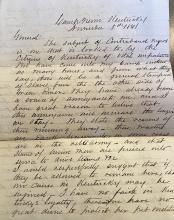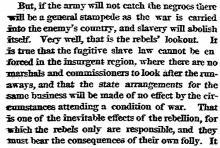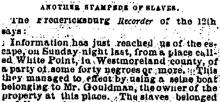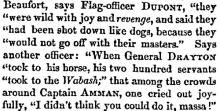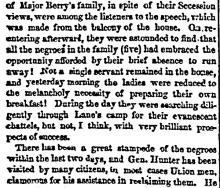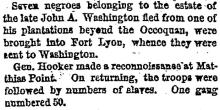View All Documents // 1840s // 1850s // 1860s
Displaying 951 - 1000 of 1135
[PER PONY EXPRESS.]
Letter from Washington.
[EDITORIAL CORRESPONDENCE.]
[Continued from yesterday.]
WASHINGTON, April 20, 1861.
The Civil War––North and South Contrasted.
[PER PONY EXPRESS.]
Letter from New York.
[FROM OUR OWN CORRESPONDENT.]
NEW YORK, April 27, 1861.
Advices from your city of the 13th instant were published in our journals of yesterday morning.
Safe Arrival of California Treasure.
REPRISALS AND THE BLACKS.
The New York Courier and Enquirer had been conspicuous for twenty-five years, for its opposition to what are called "Abolition" ideas, and yet we find it recently using the following language:
FROM THE (WASHINGTON) NATIONAL REPUBLICAN.
REPRISALS AND THE BLACKS.
The New York Courier and Enquirer had been conspicuous for twenty-five years, for its opposition to what are called "Abolition" ideas, and yet we find it recently using the following language:
FIRST EDITION
BY TELEGRAPH.
WAR MOVEMENTS!
OCCUPATION OF NEWPORT POINT.
THE FUGITIVE SLAVE QUESTION
Washington, May 29, 1861.
FROM FORTRESS MONROE
Movements in Advance -- Col. Duryea Acting Brigadier -- Important Proclamation -- The Zouaves at Camp Butler -- Stampede of Slaves, &c
...The slaves are running away from their masters in troops. Daily they are brought into camp or to the fortress by the sentries. The soldiers have orders not to interfere with the rights of persons or property, and when the negroes run away they do it without solicitation from any of our forces. It is but the fulfillment of the prophecies of the loss which would be entailed upon the Southern States, and especially Virginia, if secession was carried to a bloody issue. G.C.
[Editor's Note: The majority of this article has been omitted from our transcription except for the portions directly mentioning the term "slave stampedes" or some variant.]
A Negro Stampede Apprehended.
It appears by advices from Fortress Monroe that there is likely to be a stampede of negroes throughout Virginia.
BY TELEGRAPH.
Subjugation of the Rebels.
NEW YORK, May 30. – The Times’ Washington correspondent speculates as follows:
The News.
...The determination of the government to sustain Gen. Butler's act of receiving and detaining slaves, will cause a stampede among that species of contraband goods in Virginia. Wheaton says that "all warlike instruments or materials, by their own nature fit to be used in war," are contraband. It cannot be denied that slaves come under this definition. If they are received and set at work they must be protected and fed. Should it become necessary, they would, in an emergency, upon the same principle, be furnished with arms, to aid in their own defense and of that of their captors. This is the beginning of the end of slavery. It is well that a Breckenridge democrat should commence the work....
[Editor's Note: The majority of this article has been omitted from our transcription except for the portions directly mentioning the term "slave stampedes" or some variant.]
CARRYING THE WAR INTO AFRICA SURE ENOUGH.––A few days ago it was reported that three fugitive slaves had sought the refuge of General Butler's camp at Fortress Monroe, and that, in answer to the requisition of their master the General had declared them contraband of war, and so had retained them and set them to work. Next day, it appears, eleven more of these contraband niggers drop in, and the day succeeding forty more, and the day after that there is an accession of a hundred. Apprehending next a general slave stampede into the camp, General Butler appeals to Washington for instructions concerning these contraband niggers. The President approves of his conduct, and he is recommended to go on as he has begun.
It appears by advices from Fortress Monroe that there is likely to be a stampede of slaves from Virginia.
THOSE CONTRABAND NIGGERS.––At the last accounts upwards of four hundred fugitive slaves had sought the shelter of General Butler's camp, and the cry was "still they come." A general stampede was expected, and indeed a general revolt among the blacks of that populous slave section of the Old Dominion. In this thing General Butler has fired a heavy shot at the "long, low, black, raking schooner" of secession, which has struck her between wind and water. These fugitive slaves, at this rate, will soon prove more powerful in suffocating this Southern white insurrection than all the armies of General Scott. This man, Butler, in this thing, has proved himself the greatest lawyer to have [illegible] between a pair of epaulettes.
NON-INTERFERENCE WITH SLAVERY.––The idea that Northern troops are to act as slave police for the South, is thus referred to by the Congregational Herald:
NEW YORK, MAY 30.
The Times Washington correspondent speculates as follows:
The Crisis and Its Responsibilities––The Union or the Destruction of Our Country.
...
THOSE CONTRABAND NIGGERS. – At the last accounts upwards of four hundred fugitive slaves had sought the shelter of General Butler’s camp, and the cry was “still they come.” A general Stampede was expected, and indeed a general revolt among the blacks of the populous slave section of the Old Dominion. In this thing General Butler has fired a heavy shot at the “long, low, black, raking schooner” of secession, which has struck her between wind and water. These fugitive slaves, at this rate, will soon prove more powerful in suffocating this Southern white insurrection than all the armies of General Scott. This man Butler, in this thing, has proved himself of the greatest lawyer we have between a pair of epaulettes.
NEGROES TAKING REFUGE AT FORT MONROE.
How Slaves Love their Masters.
It has often been said that the slaves have such an undying affection for their master, that they will not only leave them, but that in case of war, they will fight for them to the bitter end. This is beautifully exemplified by the general stampede of the Virginia chattels to Fort Monroe and other points, and by the following incident which we clip from the correspondence of the New York Times:
STAMPEDE. – One hundred fugitive slaves from Virginia, arrived at Harrisburg, Penn., in two days. Nobody obstructs them in the flight. They were in bad plight but were provided for and sent on their way to Canada. They report the mountains of Virginia to be full of them, progressing towards the North Star. Slave holders in Virginia will soon be convinced that they made an unfortunate move in seceding. They said they were in a fryingpan, and could not stand it!
THE SLAVERY QUESTION.––
...
Whilst we would take no steps to induce servile insurrection among the insurgents who now war with deadly hostility against us, a course which our humanity would shudder at, we rather think a peaceful stampede of the able bodied blacks would be a humane policy that might prevent their committing violence upon white people left on the plantations at their mercy.
At all events it is time now to have due consideration given to this subject. Some provision should be made for getting rid of all fugitives who do come, and it would be well for the government to have some plan digested before Congress meets on the 4th of July next to provide for all the exigencies of the case that may occur.
...
SENEX, Trenton, New Jersey.
The Test of Unionism.
The following able article, from the pen of H. Fauntieroy, Esq., now a resident of this place, and late of Nashville, was written on the 16th of April last, for the Banner of that city, and was put in type, but withdrawn and returned to the author on account of the excitement and terrorism that forbade its publication. At the request of many of his friends, we give it to the public as a sample of the writer's bold and courageous advocacy, at the peril of his safety, of the cause of the Union, uncompromising devotion to which induced him to leave the State upon its treasonable defection:
...
Slave Difficulties at Fortress Monroe.
The Mystery of the Rebel Campaign in Virginia––Mr. Seward's Programme.
...
ENGLISH SPECULATION ON THE WAR AND ITS ISSUE.
[From the London Times, June 19.]
...Wherever the Northern regiments come we may presume that the secessionist inhabitants will take flight, choosing rather to trust themselves to the precarious hospitality of their more Southern neighbors than to remain under the authority of commanders who have denounced them as rebels, and even meditated the confiscation of their property. On the other hand, the flight of the slaves in the invaded parts of Virginia is spoken of as likely to become a "stampede'––a word which the Americans have borrowed from their prairies, and applied most expressively to a general rush of negroes from slavery....
[Editor's Note: The majority of this article has been omitted from our transcription except for the portions directly mentioning the term "slave stampedes" or some variant.]
Our Southern Rebellion––A Speedy Settlement or the Collapse of Southern Institutions.
...Of course, with the advance of our troops into the populous slave regions of the South, there will be a fugitive movement among the slaves which may soon extend to a general stampede among them, or to their ruinous demoralization throughout the South. Thus, impressed with the conviction that this war has already reached a point that menaces the most serious consequences to the South, in connection with this institution of slavery, we would earnestly admonish our revolted States that their only hope of safety, security and future protection depends upon their immediate return to the Union....
[Editor's Note: The majority of this article has been omitted from our transcription except for the portions directly mentioning the term "slave stampedes" or some variant.]
THE ADVANCING ARMY AND THE SLAVES.
...If actual servile insurrection should break out with all its unutterable horrors, they would unquestionably suppress it at the first call of Gov. Pierrepont and the President. The laws of humanity would require this. But if it were only a peaceful secession of slaves, even though it took the form of an actual stampede, it would not be for them to arrest it. Our soldiers were never made to be slave overseers; and no men at the South, whether he be rebellious or loyal, must for a moment expect it. Whatever loses Virginia shall meet in this way, she must patiently take as one of the necessary consequences of her infatuation....
[Editor's Note: The majority of this article has been omitted from our transcription except for the portions directly mentioning the term "slave stampedes" or some variant.]
Withdrawal of troops from Hampton— One Thousand Troops at the Fortress— Approach of the Confederates. &c.
FORTRESS MONROE, July 27. — Three remaining companies of the four regiments ordered to Washington will leave Old Point by the Baltimore boat. Thirty sick go with them to Washington in charge of Dr. Wainright, of the Scott Life Guard.
Immense Rush of Negroes to Fortress Monroe
A dispatch from Fortress Monroe, dated July 26th, says:
It became apparent, early last evening that the rebels meditated an attack on Hampton. The rebels mediated an attack on Hampton. General Butler determined to abandon the town in case of a formidable advance, and at seven o’clock the order was given for families and goods to be removed. Within one hour orders were also issued to burn the town rather than have it fall into the hands of the enemy. The General well understands that the possession of Hampton by the rebels will be no particular importance.
How the Negro Pants for Freedom.
“The war has dispelled one delusion of the Abolitionists. The negroes regard them as enemies instead of friends. No insurrection has occurred in the South— no important stampede of slaves has evinced their desire for freedom. On the contrary, they have jeered at and insulted our troops, have readily enlisted in the rebel army, and on Sunday, at Manassas, shot down our men with as much alacrity as if abolition had never existed.— These are the creature for whose sake Lovejoy, Chandler and Pomeroy are agitating the nation, and to whom they would unconditionally extend the privilege of freedom. A more abject, treacherous race never lived on the face of the earth. – Chicago Times.
THEY WOULD STAY AT HOME.
RUNAWAYS.––Slaves appear to have become a very slippery kind of property in Missouri lately. Their late recent flights from some of the troubled counties of the State have amounted almost to a stampede. In very many instances the runaways have found themselves very acceptable as cooks and servants in some of the many military encampements in this neighborhood. In addition to the arrests already recorded, two were made yesterday--one of the negroes, named Washington, belonging to James Halbend, of Crawford county; the other belonging to Mr. Hurlbut, of Calloway county. The owners were at once notified.
Army Orders Placing Certain Powers in the Hands of State Governors––Brigadier Generals Appointed––Stampede of Negroes from Lewinsville––The Colors of the 79th N.Y. Regiment Restored––All Quiet in the cmaps.
...There was a stampede of negroes, 14 in number, consisting of men, women and children in the neighborhood of Lewinsville to-day. They came to our lines, saying they were to be sent to Manassas this morning. Gen. Smith sent them to Washington. They belonged to the estate of the late Commodore Jones. They stated that they left at home only a daughter of the Commodore, her mother having departed some time ago for Manassas Junction....
[Editor's Note: The majority of this article has been omitted from our transcription except for the portions directly mentioning the term "slave stampedes" or some variant.]
RUNAWAY.––We saw five runaway slaves taken to the calaboose yesterday evening by persons who had taken them. The slaves passed entirely through the Federal forces here and no. interruption whatever occurred. The secessionists have charged that the purpose of this war was to free the negroes, and have talked so much about it, that it is no wonder their negroes leave them. They may blame themselves for the present stampede among slaves. The Government never meant to interfere with their negroes, but they pronounced it a lie. They now see their folly.––[St. Joseph Journal, 18th.
There was a stampede of negroes, 14 in number, consisting of men, women and children in the neighborhood of Lewinsville to-day. They came to our lines, saying they were to be sent to Manassas this morning. Gen. Smith sent them to Washington. They belonged to the estate of the late Commodore Jones. They stated that they left at home only a daughter of the Commodore, her mother having departed some time ago for Manassas Junction.
Stampede of Negroes.
There was a stampede of negroes, 14 in number, men, women and children, in the neighborhood to Lewinsville today. They came to our lines seeking protection, saying they were to have been sent to Manassas this morning. Gen Smith sent them to Washington. They belong to the estate of the late Commodore Jones. They stated that this left at their home only a daughter of the Commodores, her mother having departed sometime ago for Manassas Junction.
Fourteen negros, the property of the late Com. Jones, made a stampede from near Lewinsville, and came into our lines. Gen. Smith sent them to Washington. The negros say they were to have been sent South.
MORE ABOLITION HOPES FROM THE FREMONT MEASURE.
[From the London Star, Sept. 18.]
Already the slaves of insurrectionists in Missouri are declared free. Neither reason nor necessity will allow the abolition movement to halt half-way. Whosoever is not with the Union must be deemed against it. Only active allegiance can secure to a slaveowner the legal possession of his human chattels, and as these are locomotive articles the legal security may prove of little worth in a general stampede. The spirit of the New England regiments that march through New York singing John Brown's hymn may breed infection in the federal camp.
Change of Sentiment in Maryland––Stampedes of Slaves
The secessionists in Maryland are gradually becoming converted from the error of their ways. Their first symptom is an extraordinary avidity to secure places of emolument under the government.
Several citizens of Baltimore, who were blatant secessionists one month ago, are pestering the departments here for offices. There is a great change of sentiment in Maryland, caused by the vigorous measures of the government and the evident impossibility of the accomplishment of the treasonable purposes upon which the rebels had set their hearts.
Several stampedes of slaves have recently occurred in Worcester county, Maryland. The negroes begin to understand that they can make hay while the sun shines, and are running away as fast as their legs can carry them.
NEW YORK, Oct. 12.
A special dispatch to the Post, dated Washington Oct. 12, says: Several stampedes of slaves have occurred in Worcester county, Maryland....
[Editor's Note: The majority of this article has been omitted from our transcription except for the portions directly mentioning the term "slave stampedes" or some variant.]
TELEGRAPHIC.
Last Night’s Report.
Capt. Orris Blake Provost Marshall will at once make diligent search for a negro boy belonging ot Mrs. Rebecca H. Hill of Elizabethtown Hardin Co Ky and if found in camp will arrest him and send him home by first opportunity
By order of
Genl A McD McCook
Camp Nevin Kentucky November 5th 1861
General: The subject of Contraband negros is one that is looked to, by the Citizens of Kentucky of vital importance Ten have come into my Camp within as many hours, and from what they say, there will be a general Stampeed [stampede] of slaves from the other side of Green River– They have already become a source of annoyance to me, and I have great reason to belive that this annoyance will increase the longer we stay– They state the reasons of their running away–there masters are rank Secessionists, in some cases are in the rebel army–and that Slaves of union men are pressed into service to drive teams &&c
Louisville Kenty Nov 8, 1861
Sir I have no instructions from Government on the subject of Negroes, my opinion is that the laws of the state of Kentucky are in full force and that negroes must be surrendered on application of their masters or agents or delivered over to the sheriff of the County. We have nothing to do with them at all and you should not let them take refuge in Camp. It forms a source of misrepresentation by which Union men are estranged from our Cause
I know it is almost impossible for you to ascertain in any case the owner of the negro, but so it is, his word is not taken in evidence and you will send them away I am yours
WT Sherman
The Republican.
WEDNESDAY MORNING, NOVEMBER 13, 1861.
The War and Slavery.
Richmond (VA) Daily Dispatch, "Latest Southern News - Another Stampede of Slaves," November 14, 1861
ANOTHER STAMPEDE OF SLAVES.
The Fredericksburg Recorder of the 12th says:
Is Slavery to be an Element in the War?
...Neither the rendition of fugitives by our commanders early in the contest, nor the subsequent reception and employment of many hundreds of them by General BUTLER, at Fortress Monroe, nor the later "confiscation decree" of FREMONT, in Missouri, appear to have had any considerable result. Whether this was because, in all the regions hitherto the theatre of war, the whites were far in excess of the slaves, and therefore held them under the bonds of ancient awe, or whatever may have been the cause, the result is certain––that there has nowhere, until now, been any "stampede" or insurrectionary movement of remarkable importance....
Important from Missouri.
...There has been a general stampede of the negroes within the last two days, and Gen. Hunter has been visited by many citizens, in most cases Union men, clamorous for his assistance in reclaiming them. He gives them written permission to search through all the camps, and take their slaves if they can find them; but I have not yet heard of an instance in which one has been found....
[Editor's Note: The majority of this article has been omitted from our transcription except for the portions directly mentioning the term "slave stampedes" or some variant.]
Stampede from the Patriarchal Relation.
Capt. Bennett with a party of fifty cavalry ventured four miles within the rebel pickets beyond Alexandria. He reports that many of the dwellings, built in fine taste and surrounded by beautiful gardens and shrubbery, have been deserted by their owners, who have not even taken care of their contacts. He saw silverware and other valuables lying on the tables and in the closets, the building in all their appointments bearing evidence of having been abandoned in great hastes. Many of the negroes that he met begged most piteously of him to take them in safety to his camp. There was a general desire expressed by them to come within the Federal lines.


